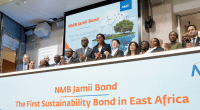The African Caucus was set up in 1963 to bring the voice of African central bank governors and finance ministers to the Bretton Woods institutions, and is quietly pursuing its mission. Just a few days ago, its current Chairman, Nigeria's Wale Edun, met with the Managing Director of the International Monetary Fund (IMF) to discuss the continent's economic recovery.
The African Caucus was set up in 1963 to bring the voice of African central bank governors and finance ministers to the Bretton Woods institutions, and is quietly pursuing its mission. Just a few days ago, its current Chairman, Nigeria’s Wale Edun, met with the Managing Director of the International Monetary Fund (IMF) to discuss the continent’s economic recovery.
The Spring Meetings of the World Bank and the International Monetary Fund (IMF) were held recently in Washington DC in the United States of America. On the sidelines of these meetings, the Managing Director of the IMF had a one-to-one discussion with Wale Edun, the current Chairman of the African Caucus, a platform for the economic sovereignty of Africa’s 54 countries.
Wale Edun, who is also Nigeria’s Finance Minister, listened to Kristalina Georgieva’s optimism, arguing for example that “almost two-thirds of the continent’s nations will post a good trend thanks to a slight easing of global financial conditions and a recovery in private investment and consumption”.
In other words, alarmist notes are not welcome at this time of economic transition. On this issue, the Managing Director of the IMF pointed out to her Nigerian host that “some countries have returned to the international capital markets after a hiatus of almost two years”. This is a good sign for Africa’s growth, which the Bretton Woods institutions estimate at 3.5% in 2024 and 4% in 2025.
Read also-
Wale Edun’s message to his ministerial counterparts and the governors of the central banks of West, East, Southern and Central Africa is therefore clear: pool innovative financing strategies to tackle the obstacles to the current recovery. The priority is “climate shocks such as severe droughts and floods that exacerbate food insecurity and poverty“, Georgieva said.
Benoit-Ivan Wansi






